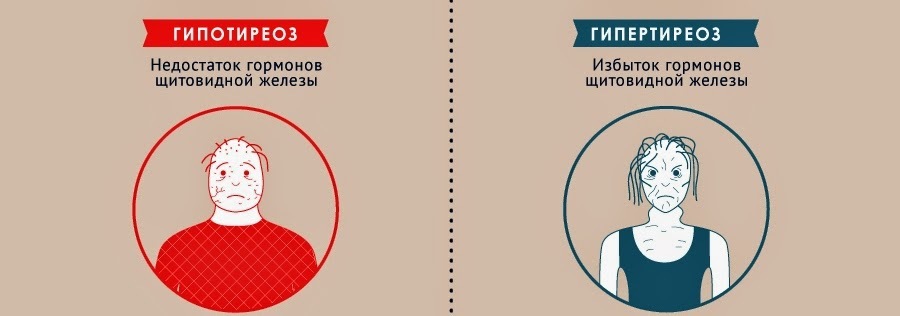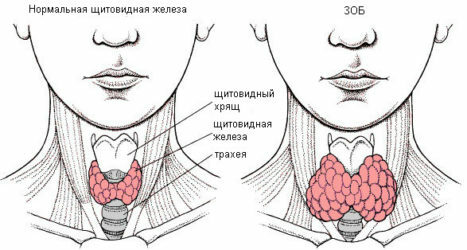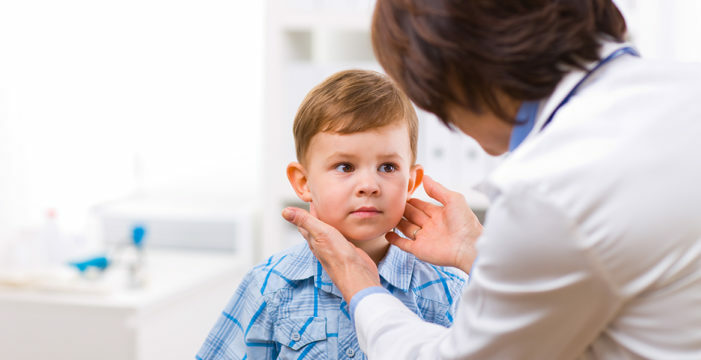The thyroid gland is the most important gland of our body. Violations of its function lead to different diseases in the human body. The most common of these are hypothyroidism and hyperthyroidism.

Hypothyroidism
Hypothyroidism is a functional condition in which the thyroid gland does not release enough hormones. Hyperthyroidism is characterized by the opposite, their increase. According to the course of the disease, they differ significantly from each other.
Symptoms of hypothyroidism very often depend on the degree of the ongoing disease. At the initial stages, the disease can be virtually asymptomatic, and further manifested:
- weight gain,
- weakness,
- apathy,
- in women - possible menstrual disorder,
- , there may be abnormalities on the part of the digestive system.
- puffiness of face, larynx is noted, as a result, the voice becomes hoarse and low.
Hypothyroidism, maybe both congenital and acquired. Most often, it is due to iodine deficiency.
Types of hypothyroidism:
- primary( thyreogenic) - this diagnosis is made with a lack of thyroid hormones in the body;
- secondary( pituitary) - develops due to pituitary diseases or with a decrease in its functions and, as a consequence, a decrease in the production of necessary hormones
- tertiary( hypothalamic) - is caused by a primary lesion of hypothalamic centers that release the hormone tiroliberin. The most severe stage, affecting the cardiovascular and nervous systems of the body.
Treatment of hypothyroidism
Treatment of hypothyroidism should be carried out in a complex:
- Initially, the treatment of diseases leading to it should be carried out. Very often, the reason is the lack of iodine. In this case, the patient is prescribed drugs based on this element, as well as therapy with hormones that are substitutes for natural thyroid hormones.
- In parallel, a person needs medicines to help stop the disease and support the function of other organs.
- Do not forget about the diet. In the human diet, it is necessary to reduce foods rich in fat and cholesterol, as well as fast carbohydrates. Cook better for a couple, so the food will be more vitamins, the number of proteins must be increased.
Hyperthyroidism
Hyperthyroidism manifests itself most often by disorders from the central nervous system, nervousness, increased heart rate, weight loss, increased excitability, irritability.
The main symptom of a neglected disease is an increase in the eye fissures, the displacement of the eyeball, its slow response and restriction of mobility, edema of the eyelids. In the absence of timely treatment, corneal disorders can occur due to dry eye and delayed lacrimal gland function, possibly blindness. In addition, there are still symptoms of hyperthyroidism, such as:
- finger and eyelid tremor,
- fragility and brittle bones,
- tachycardia and hypertension.
Hyperthyroidism may occur if there are any pathologies of the pituitary gland or viral diseases. Hyperthyroidism is one of the main manifestations of diffuse toxic goiter( hyperfunction and enlargement of the gland in size).

Types of hyperthyroidism:
- Primary is a disorder caused by increased production of thyroid hormones. Most often associated with damage to the thyroid itself.
- Secondary, like hypothyroidism, is caused by a disruption of the pituitary and hypothalamus, most often caused by congenital pathologies.
Secondary hyperthyroidism is rare.
Treatment of hyperthyroidism
Various methods of treatment are used in different stages of the disease, but always it is a medical treatment prescribed for the patient to suppress the increased activity of the thyroid gland.
The diet, as well as with hypothyroidism, is not the last thing. A person needs a full-fledged diet, including both proteins, and fats, and carbohydrates. Preference is given to give vegetable food, exclude the same from the diet, preferably any food and drinks that have an exciting effect on the central nervous system.
The most severe treatment can be considered a surgical intervention. In this case, part or all of the thyroid organ is removed. Whether it is necessary to perform an operation is decided only by the attending physician.
Differences in diseases and methods of therapy for both diseases can be seen in the table below:
| Hypothyroidism | hyperthyroidism | |
| symptoms from the central nervous system |
|
|
| physical changes inbody |
|
|
| hormonal changes in the body | deficiency of thyroid hormones | high concentrationthyroid hormones |
| treatment |
|
|
| diet |
|
|
| prevention |
|
|
If to compare a hyperthyroidism and a hypothyrosis it is possible to tell unequivocally that any deviations in work of a thyroid gland can lead to serious consequences and to affect work of almost all systems and organs of an organism. Therefore, the treatment of any endocrine diseases should be timely and fully implemented.
Can hypothyroidism go to hyperthyroidism or vice versa? This option is only possible if the diagnosis is incorrect. Since the diseases have significant differences, it is necessary to approach the diagnosis very accurately.
Only a doctor can make the necessary examination and prescribe the drugs in the correct dosage. In no case should it be necessary to treat hyperthyroidism and hypothyroidism independently at home.
To prevent the emergence and development of diseases, it is necessary to conduct preventive measures in a timely manner, to be examined by a doctor, to lead a healthy lifestyle and to eat right. If you follow all the rules of problems with hormonal levels in the body does not arise.




